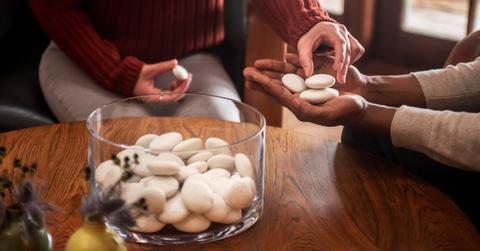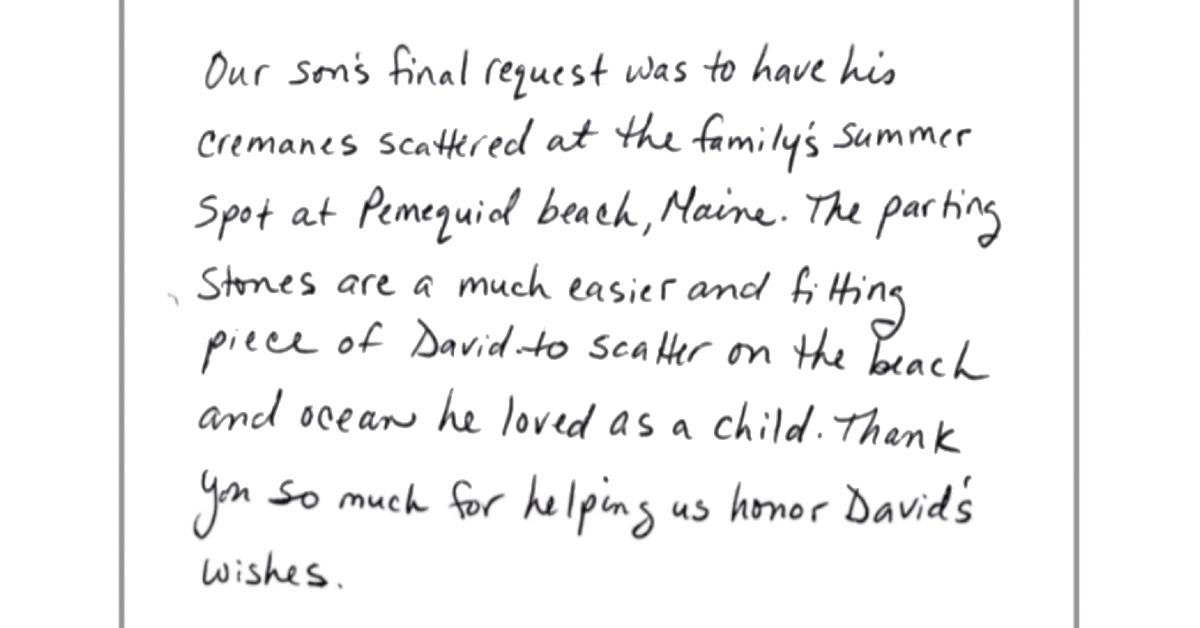Death Care Startup Parting Stone Makes Scattering Cremated Remains More Eco-Friendly (Exclusive)
"The way we have been doing things for the past 100, 200 years does not have to be the way we do things forever. There is room for innovation."
Published Aug. 2 2024, 10:42 a.m. ET

From ugly outdated urns to Mason jars to Wilson tennis ball tubes, people keep their family members' cremated ash remains in all kinds of odd containers, which typically end up in not-so-sentimental spaces. Why? Well, as mentioned by Justin Crowe — the founder and CEO of innovative solidified remains company Parting Stone — many are "uncomfortable" with ashes.
"There are 70 million people in the United States currently living with cremated remains," Crowe exclusively tells Green Matters via Zoom. "If they're anything like my friends and family, [they're keeping ashes] in a closet or basement or garage."
Crowe thought more about the concept of keeping cremated remains when his maternal grandfather passed away.

It was devastating to receive his grandfather's ashes in a tied plastic bag, a tidbit Crowe shared while presenting Parting Stone on an April 2023 episode of ABC's Shark Tank. How... impersonal, cold even.
"One woman told me that when her husband died, she was so anxious about confronting those remains, because she thought it might be a traumatic experience, that she left the remains in the trunk of her car for 10 years," he says. "This sort of seemed really tragic, because clearly people felt a connection with the remains ... they were just hiding them."
On a journey to bring life back to cremation, so to speak, Crowe founded death tech company Parting Stone in 2019, which invented a solidified form of human and animal remains through a grant with Los Alamos National Laboratory. The lab's material scientists helped Parting Stone "figure out a method of solidifying the ashes into something that feels a little bit more like ceramic."
Parting Stone turns the entirety of ash remains into a set of smooth-touch stones (which won't dissolve in water) that look lovely in a garden and feel comforting in your palm.
"I think it allows people to comfortably have memorials for the people and pets in their life who they love," he shares.
The startup currently works with about 600 funeral homes.
"We are — as far as I know — the only company in the world offering a full amount alternative to conventional cremated remains," Crowe tells us.
In conversation with Green Matters, Justin Crowe got candid about the planet-respecting impact of Parting Stone in the traditionally unsustainable death care industry and the impact of Shark Tank.
How does Parting Stone prioritize sustainability?
It's been estimated that cremations in the U.S. are responsible for approximately 360,000 metric tons of carbon dioxide emissions annually, per a 2021 HuffPost piece. However, this is not where Parting Stone's sustainable nature comes in.
"We're not a form of disposition," Crowe explains to Green Matters. "The body first has to be reduced to ash. And then we take the ash and basically compress the full amount. So the average person ends up [being about] 60 to 80 stones."
Parting Stone accepts traditional ash remains and alkaline hydrolysis (or water cremation) remains.
Parting Stone's green impact relates to the sentimental ritual of scattering cremated remains.
"The bottom line with how we are eco-friendly — how solidified remains are eco-friendly — is that if you plan to scatter the [solidified stone] remains, it has little to no impact on the environment," he explains.
Crowe shared a 2021 study with Green Matters that was done on behalf of Parting Stone at Los Alamos National Laboratories, titled "Environmental Impact of Cremation Remains."
The Earth Systems Observations Group "put ashes in one [greenhouse potted] plant and they put the solidified remains in the other [greenhouse potted] plant," Crowe says. "Then they measured, over [about a year], the pH of the soil, and the soil with the solidified remains didn't change very much at all, the soil with the ashes significantly increased [regarding pH]. ... We don't want to change the natural pH of soil in the environment anywhere, whether the plant likes it or not; we want it to be the natural environment."

According to Mornington Green Legacy Gardens — a botanic memorial garden in Australia — untreated human ash remains are loaded with phosphates, calcium, potassium, and sodium, but not at appropriate levels for healthy plant growth. Scattering these ashes contributes to environmental issues like salinity, eutrophication, and acidity.
The LANL report also concludes that "while ash substantially altered soil water chemistry in an over 1.5 year-long outdoor field experiment, that stones had little to no effect on soil water chemistry." It notes that the stones "were exposed to multiple precipitation events (natural and man-made) and continuously exposed to the elements for a substantial amount of time."
Overall, the experiments reveal that solidified stone remains "are a much more environmentally benign option than ash."
How much does it cost to solidify ash remains with Parting Stone?
"Our pricing right now is $2,495 for a person," Crowe shares. "We did increase our price following our Shark Tank episode. This was something we knew we needed to do to stay afloat."
To solidify a dog's remains, Parting Stone charges $995, and to solidify a cat's remains, it costs $795.
Justin Crowe reveals the impact of Parting Stone appearing on 'Shark Tank': "Mass education."
During the April 7, 2023, episode of Shark Tank, Crowe accepted a joint offer from sharks Lori Greiner and Kevin O’Leary: $400,000 for 10 percent equity plus a $20 royalty for DTC and a $12.50 business-to-business royalty until the $400,000 is paid.
"One of our biggest challenges was just educating people that this is an option," Crowe begins. "I want people to know that when they walk into a funeral home, they don't have to receive ashes. To have the opportunity to stand on [the Shark Tank] stage in front of 10 million people and tell my story and share the technology was just a huge opportunity."
Since the episode aired, Crowe says families are asking funeral homes for the solidified remains option.
"They're educating the funeral directors, so we're getting more funeral homes coming on board," he says.
Crowe relays Greiner and O’Leary have been "really valuable" and that he's "so grateful to have them on the Parting Stone team."
In the end, Crowe believes it's important for the death care space to prioritize sustainability because "[death] is one of the inevitable events of every person's life, and it's not going away."